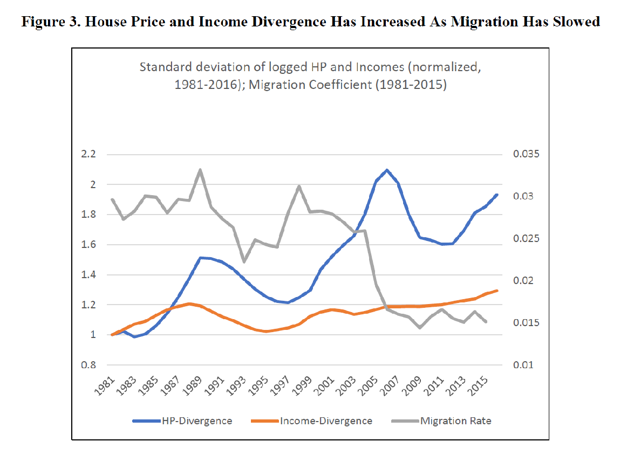Connecting state and local government leaders
New research shows how housing and income inequality reinforce one another, effectively splitting the U.S. into two different economies.
America today faces a two-headed problem: economic inequality and housing inequality. The former has soared to heights not seen since the Gilded Age. The latter, as home prices spike in coastal superstar cities and lag in much of the country’s middle, has become a main feature of our divided, winner-take-all geography.
The two phenomena are intertwined and mutually reinforcing. Together, they act as a brake on the performance of the economy and limit both migration and upward mobility.
Those are the big takeaways from a new working paper by researchers at the International Monetary Fund (IMF). Tamim Bayoumi and Jelle Barkema examine the connections between economic inequality and housing inequality on the one hand, and migration and economic mobility on the other, across the two-decade period spanning 1996 to 2016. Their data on housing inequality comes from Zillow’s Home Value Database, which tracks housing values for more than 500 regions of the country; on income inequality, from the U.S. Census Bureau and U.S. Bureau of Labor Statistics; and on migration, from detailed Internal Revenue Service statistics on the flow of households by income.

The chart above captures the big picture. Between 1981 and 2016, income divergence—the orange line on the graph—has increased, while the divergence in housing prices—the blue line—has increased even more. Over the whole period, the ratio of housing prices to income (based on the study’s measures of logarithms of their median values) went up by nearly 40 percent, driven by the clustering of high-skilled industries and jobs and the dramatic run-up in housing prices in leading tech hubs and superstar cities. Meanwhile, the migration rate—the gray line—nose-dived, literally dropping by half.
The rise of housing inequality forms the first part of America’s core economic challenge. The widening gap in housing prices between superstar and other cities has thrown a monkey-wrench into a potential equalizer: moving to economic opportunity. This is particularly true for less skilled and less educated workers in lagging parts of the country. These folks have homes that are worth less—many of them were underwater during the Great Recession—so they are unable to foot the bill to live in dynamic and expensive cities.
Indeed, the big decline in overall migration is mainly due to the decline in the mobility of less-skilled workers moving out of trailing regions, according to the IMF study. Even as overall mobility has declined, more educated and skilled workers—those with a college degree—continue to have higher rates of inter-state mobility and are about twice as likely as others to move.
Based on detailed and granular IRS data, the study finds that “while migration out of metro areas in the lowest quartile of median income fell by 25 percent, the reductions get progressively smaller as median income rises, culminating in a fall of only 10 percent for metro areas in the top quartile.” Ultimately, the researchers’ statistical models explain as much as two-thirds of the decline in the migration of Americans between lagging and leading metros across the country.
The consequence of this is that less skilled workers in less dynamic areas are essentially trapped there. “The key insight is a marked asymmetry in the behavior of people moving from poorer to richer metro areas compared to those moving in the reverse direction,” the authors write:
The discouragement to moving from a poor to a rich metro area coming from wider divergences in house prices has outpaced the positive impacts to migration from greater differences in incomes—the centrifugal effects of rising wealth inequality dominate the centripetal effects of more income inequality, providing a direct link between rising inequality and the problems of those “left behind.”
The divergence in incomes, or more specifically the widening geographic gap in the location of high-tech industries and high-skill jobs, forms the second part of problem. This paper adds an important wrinkle to our understanding of the relationship between skills and mobility. Other economic studies have seen a convergence in jobs and skills around the U.S., pinning the blame for declining mobility on the fact that job markets overall have become increasingly similar across cities. But the IMF study finds much greater divergence in the location of high-skill, high-tech jobs, which cluster in leading hubs and superstar cities. This lends support to the concerns of economic geographers Michael Storper and Andrés Rodríguez-Pose, who argue that spatial inequality is driven by the uneven distribution and clustering of industries and skill.
Bayoumi and Barkema contend that these two dimensions of America’s growing spatial inequality act as twin blades of a double-edged sword. On the one hand, the gap in housing prices effectively locks less advantaged people in less advantaged places, denying them the opportunities that would come from more dynamic job markets. On the other, the uneven distribution of industries and skills makes it financially infeasible for higher-skilled workers to move to second-tier cities because they lack the right jobs.
The consequence is a Darwinian sorting process, whereby more advantaged and highly skilled workers crowd into the tech hubs and superstar cities where those jobs are. “Metro areas with high house price due to limited space attract skilled workers at the expense of the unskilled,” the researchers observe. “This gentrification accumulates over time as the ratio of skilled workers in the overall work force rises, further raising wage and home price inequality.” It isn’t just that there’s too little housing, it’s that the skill composition of the economy is uneven and unbalanced. All of this spills over into crucial public services and amenities.
The places that attract more skilled, better-paid workers also gain the revenues needed to fund better schools and parks and museums and bolster their amenities. All of these things become harder to keep up in less advantaged places, exacerbating the gap between different parts of the country over time.
These two forces feed off of and reinforce each other as housing prices grow more unequal and jobs and skills continue to concentrate in a small subset of cities. “Increasing divergences in returns to land (house prices) is discouraging migration to prosperous areas even as widening divergences in returns to labor (earnings) is reducing migration in the opposite direction,” Bayoumi and Barkema add. “Prices are moving, not people.”
Hardest hit are the least advantaged, least educated, and least skilled Americans, left with no way out. The end result is the creation of two separate and geographically distinct U.S. economies, with limited interaction between them—a divide that pulls America apart culturally and politically as well.
Ultimately, this study helps us better understand the debate between market urbanists, who argue that housing forms the root of our economic challenges and who see the way out in zoning reform and increased housing supply, and others like Storper and Rodríguez-Pose, who say the problem stems from the highly skewed distribution of economic activity and skill, and who argue for place-based policies to bolster the economies of lagging areas.
As the IMF research shows, America faces a double economic challenge of housing and income inequality. There are no quick fixes or magic-bullet solutions. It requires a broad and holistic mix of policy tools, spanning economic development, the promotion of clusters and hubs, place-making, mobility, worker training, and job creation and upgrading, as well as housing and zoning reform.
Richard Florida is a co-founder and editor at large of CityLab and a senior editor at The Atlantic.

NEXT STORY: Employers Barred from Asking for Job Applicant Wage Histories in More and More States



